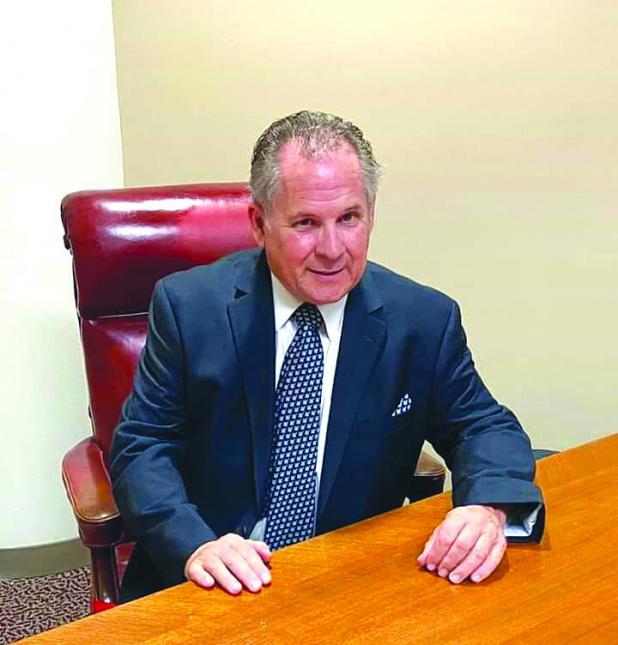
Bill Nash, seated at the late Congressman Otto Passman's desk at ULM.
Mangham pastor completes biography of Otto Passman
You could say Baton Rouge’s loss was heaven’s gain when it comes to Bill Nash.
The call to preach won out over the call of politics for the pastor of Glad Tidings Pentecostal Church in Mangham, but his lifelong interest in politics has led him to write biographies of three Louisiana politicians -- including his latest work, The Powerful Passman, a biography of the late Congressman Otto Passman.
“I’ve known since I was a child I was called to be a Pentecostal pastor,” Nash said. “There was a time in high school when I thought about becoming a lawyer and running for governor.”
Nash’s interest in politics began in the fourth grade when his teacher assigned him a project writing about Louisiana’s state government. On Jan. 20, 1969, the teacher brought a television into class and Nash watched as Richard Nixon was sworn in as president at the East Portico of the United States Capitol in Washington, D.C.
“I didn’t know it at the time, but almost 50 years later, I would lead a prayer to open a session of the U.S. House of Representatives in that same building,” Nash, who is an honorary chaplain of the Louisiana Legislature, said.
His interest in politics grew as he became involved in the FFA and held state office while attending DeRidder High School.
“I thought about becoming a lawyer and running for governor someday during that time,” Nash said, “but I tell people Baton Rouge’s loss was heaven’s gain.”
In The Powerful Passman, Nash brings his passion for politics and the scholarship of a lifelong theologian together to give the definitive study of the life and career of a man who was arguably north Louisiana’s most powerful politician.
“He grew up as one of the poorest people in the state, often living on cornbread and clabberd milk before rising to one of the highest positions in the country,” Nash said.
The book begins there, with Passman’s birth on June 27, 1900 in the San Pedro community of Washington Parish and follows his life as the son of a sharecropper. Nash talks about Passman’s father “renting him out” to a neighboring farmer to work for $5 a month and reveals how the future Congressman’s parents would ask him to leave home to find work at the age of 13 so they could afford to raise his siblings.
He talks about how Passman enrolled in night school to complete his high school education, later studying at Soule Business College in Bogalusa. Passman would eventually relocate to Monroe where he would form Passman Equipment Company in 1929. The company was involved in the manufacture of commercial refrigerators and distributed hotel and restaurant supplies and electrical appliances, but, perhaps more importantly, it was where Passman began to make the connections he would use to rise to office.
When World War II broke out, Passman joined the U.S. Navy, rising to the rank of lieutenant commander, before returning to Monroe at the end of the war to resume his business dealings briefly before running for congress as a conservative Democrat. He would serve 30 years in the U.S. House of Representatives, from 1947 to 1977.
“He grew up in poverty,” Nash said, “and he never wanted to return to poverty.”
This fear may have been the drive behind Passman’s reputation for gutting foreign aid bills, trying to keep tax dollars at home. He would also make supporting American veterans a priority during his term in Congress.
The details of those 30 years are painstakingly documented in Nash’s book. He spent more than four years researching it by going through 270 filing cabinets filled with documents donated to the University of Louisiana - Monroe by the late Congressman.
“The first term, he didn’t do a lot of record keeping,” Nash said, “but by the second term, he’d gotten the hang of it. Each of those 270 filing cabinets had four draws with 200 to 300 papers in them.”
Nash also interviewed friends and colleagues of Passman’s such as former Gov. Edwin Edwards and former Secretary of State Jim Brown.
Nash has also written High Hat Sam, a biography of former Louisiana Governor Sam Jones, and The Battle of the Longs about the lives of politicians Speedy and Gillis Long.
It was during research for High Hat Sam, that former superintendent of Morehouse Parish schools Richard Hartley, and former assistant to Lieutenant Gov. Jay Dardenne suggested Nash do a book on the life of Passman.
“He said if someone didn’t do a book on Otto Passman, we would lose that part of our history,” Nash said.
Fortunately, Nash listened and the result is The Powerful Passman, 220 pages of history and humor with more than a dozen pages of historical photos included.
Nash is currently talking with the family of former Louisiana Governor John McKeithen about starting work on his next book.
For more information about Nash’s books, he can be contacted at BillNash08@yahoo.com or by calling 318-477-0132.
